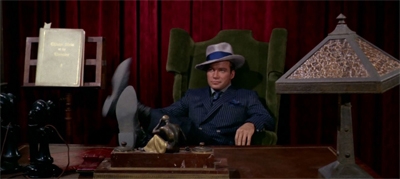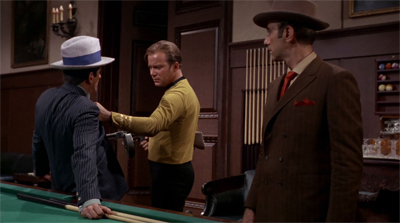This July, we’re taking a trip back in time to review the sixth season of The X-Files and the third (and final) season of Millennium.
The teaser establishes the mood quite quickly. It is a rather striking opening sequence for an episode of The X-Files, focusing on a writer staring at a blank page. The sequence cuts through time as the writer searches for inspiration, trying to take his cue from the index cards helpfully arranged on the wall. Eventually, the writer makes a grand gesture. He reaches into his chest, and pulls out his heart. It is a very effective opening sequence, one that makes it clear that Milagro will not be a normal episode of The X-Files.
The sequence also makes it clear that Milagro will not will it be a subtle piece of television. The teaser is not a particularly elegant metaphor, but it is an effective one. What is writing but tearing out a piece of yourself? Sometimes you have to wear your heart on your sleeve; sometimes you have to put it on the page. The teaser to Milagro is a very earnest piece of work from Chris Carter, a clear acknowledgement that what follows is a deeply personal piece of work.
Filed under: The X-Files | Tagged: chris carter, endings, gender, immortality, John Hawkes, meta-fiction, milagro, scripting, scully, sex, sexuality, storytelling, the x-files, writing, x-files | 8 Comments »






























Does Cabin in the Woods Out- “Hunger Games” The Hunger Games?
Sometimes I form weird movie connections in my head – tying two particular films together even if there’s very little common ground on which to link them. For example, I sat through quite a bit of Shame thinking of Collateral, a film linked tangentially thematically, as both offered rather scathing portraits of anomie against the backdrop of a major American city. On the other hand, I also formed a rather strong connection between the superb Cabin in the Woods and the mega blockbusting phenomenon The Hunger Games. As I watched Joss Whedon and Drew Goddard’s powerful exploration of the horror genre, I couldn’t help but feel that this was exactly what The Hunger Games wanted to be, even if the film adaptation couldn’t quite manage it.
The show must go on!
Note: This article contains some background information on Cabin in Woods. Nothing too big, but I would honestly recommend that you see the film as blind as possible. It is, by some considerable margin, one of the best films of 2012, and entirely deserving of both your time and your money. This article will still be here when you get back.
Continue reading →
Filed under: Movies | Tagged: Anna Hutchison, arts, battle royale, bbc, Cabin in the Woods, chris hemsworth, debate, Drew Goddard, films, Horror fiction, Hunger Games, joss whedon, meta-fiction, Movies, reviews, social commentary, Suzanne Collins, United States, Woods, Year of the Sex Olympics | 9 Comments »